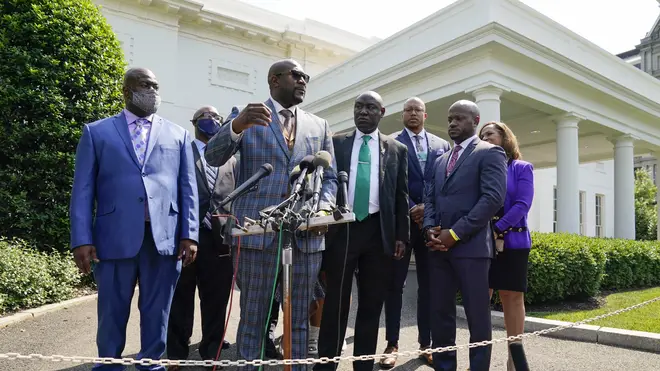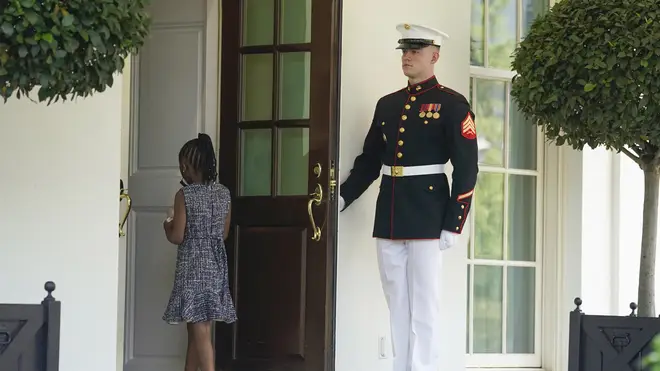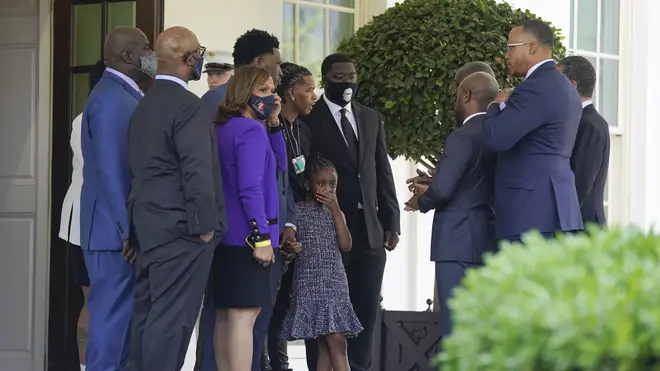
Ali Miraj 12pm - 3pm
25 May 2021, 06:48 | Updated: 25 May 2021, 22:41

Members of George Floyd's family have met the US President at the White House as vigils are held around the world in memory of him one year on from his murder.
George Floyd's death in Minneapolis prompted worldwide protests about racism and police brutality.
The Floyd family’s visit to the White House comes as US officials try to pass new US laws on police reform that would ban chokeholds, carotid holds and so-called "no-knock" warrants.
Shortly after their meeting, President Biden released a statement to applaud the strength of the Floyd family over the past year, and to urge Congress to pass a Bill named in his honour.
“Although it has been one year since their beloved brother and father was murdered, for the family – for any family experiencing a profound loss – the first year can still feel like they got the news a few seconds ago,” Biden said.
“And they’ve had to relive that pain and grief each and every time those horrific 9 minutes and 29 seconds have been replayed.
Earlier today in the Oval Office, I met with George Floyd’s family. They’ve shown extraordinary courage over the last year, especially his young daughter Gianna, who I met again today. The day before her father’s funeral, she told me, “Daddy changed the world.”
— President Biden (@POTUS) May 25, 2021
He has. pic.twitter.com/gGIKqVIEFk


“Last month’s conviction of the police officer who murdered George was another important step forward toward justice. But our progress can’t stop there,” Biden added.
“To deliver real change, we must have accountability when law enforcement officers violate their oaths, and we need to build lasting trust between the vast majority of the men and women who wear the badge honorably and the communities they are sworn to serve and protect. We can and must have both accountability and trust and in our justice system.”
“We have to act. We face an inflection point. The battle for the soul of America has been a constant push and pull between the American ideal that we’re all created equal and the harsh reality that racism has long torn us apart. At our best, the American ideal wins out. It must again.”
In the UK there are planned vigils to remember George Floyd in Bristol, Brighton and Nottingham, among others.
Pat Carmody, a member of the Oxford Stand Up to Racism group, will be taking part in a vigil later. He said: "It was the spark of a movement that said 'enough is enough.'
Today the President and I met with the family of Mr. George Floyd.
— Vice President Kamala Harris (@VP) May 25, 2021

President Joe Biden speaks after George Floyd verdict
"It resonated with people in Britain in terms of far too many deaths of black people in police custody."
George Floyd's sister Bridgett said at a recent rally: "It has been a painful year. It has been very frustrating for me and my family. For our lives to change in the blink of an eye — I still don’t know why."
In New York, Floyd’s brother, Terrence, also attended a Brooklyn gathering in his brother’s memory.
He said: “If you keep my brother’s name ringing, you’re going to keep everybody else’s name ringing.
“Breonna Taylor, Sean Bell, Ahmaud Arbery, you could go through the whole list. There’s a lot of them.”

One year on from the death of George Floyd has anything changed?
Vaughan Gething, the only person of colour in the Welsh Government's top team, said some people's attitudes still need to change. "If you've ever walked into a shop and had people follow you around and wonder what you are doing there, that's about people's attitudes and it's about your day-to-day experience."
Meanwhile campaigners in the UK have called for a crackdown on stop-and-search powers amid fears they could be extended under a controversial policing Bill.
A year on from the death of George Floyd in the US, there have been demands for an overhaul of the stop-and-search policy in the UK which allow police to search people and vehicles for drugs or weapons without a warrant.
Thousands of people in the UK took part in protests prompted by Mr Floyd's murder on May 25 last year.
The killing of the African American man by a white police officer also reignited the debate on the use of stop and search by British law enforcement, amid concerns people from black and ethnic minority backgrounds were being disproportionately targeted.
Now campaigners have warned against further sweeping powers proposed in the Police, Crime, Sentencing and Courts Bill.
The Government wants to introduce serious violence reduction orders as part of the Bill to make it easier for police to carry out checks on people who have been previously convicted of carrying a knife.
Some have also said the use of so-called s60 stop-and-search powers, under section 60 of the Criminal Justice and Public Order Act allowing police to act without any reasonable grounds for suspicion, must end.
Human rights group Justice said greater restrictions are needed on stop and search to "avoid discriminating against our country's ethnic minorities", adding the Bill would "extend punishment from prison into the community, and risk further damaging confidence in the police".
Katrina Ffrench, founder and director of organisation Unjust which scrutinises policing, said there is "no place" for s60 powers and warned the public could soon see a "morphing" of stop and search, adding: "If this Bill is passed, it is going to get much worse."
Police carried out the highest number of stop and searches in seven years, with the figure rising by more than 50% in 12 months, official statistics published in October showed.
In August 2019 the Home Office rolled back restrictions on s60 stop and searches in a bid to crack down on knife crime and violence.
Meanwhile reports published by the department suggested BAME people were likely to be targeted under the relaxed rules despite not having committed crimes and changes in the level of stop and search may have only had "minimal effects on violent crime".
Ms Ffrench called for more than "tokenistic" pledges to look again at stop and search but said there was now a growing understanding of the problems with more members of the public "speaking out".
She also described the complaints process as "not fit for purpose" and said officers need to face "proper sanctions".
Silkie Carlo, director of Big Brother Watch, called for "honesty among police" about the negative impact the tactic could be having, saying the problems needed to be addressed at "every level".
Last year members of the public were urged to sit on independent panels to scrutinise the practice.
On the anniversary of Mr Floyd's death, chief constable of West Midlands Police Sir Dave Thompson, chairman of the Police Plan of Action on Inclusion and Race and vice chairman of the National Police Chiefs' Council, said: "Much has been done to address racism, discrimination and bias where it has been found in policing but we must now go further and faster, because doing the right thing by investing in community confidence will help to keep everyone safe."